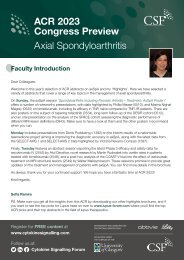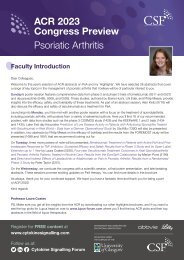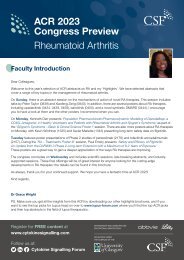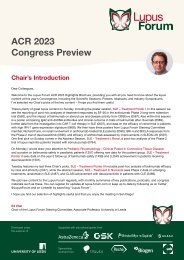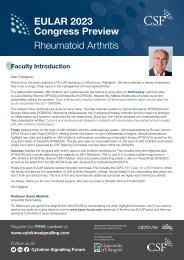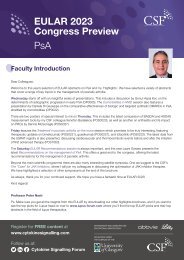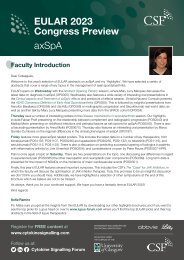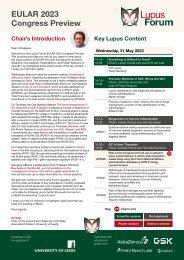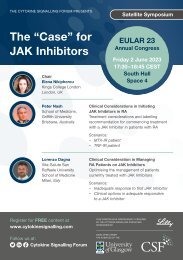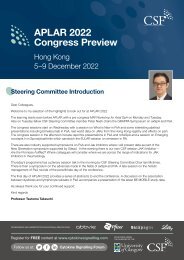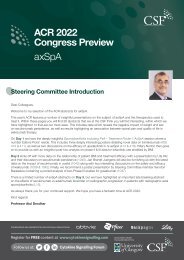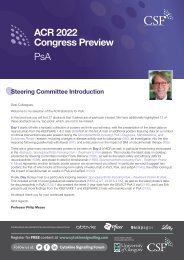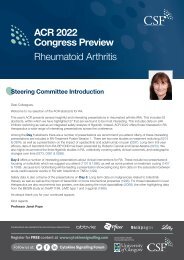ACR Congress Review 2019
You also want an ePaper? Increase the reach of your titles
YUMPU automatically turns print PDFs into web optimized ePapers that Google loves.
In summary, individually, high baseline levels of key inflammatory serum cytokines, as well as the<br />
presence of a low sICAM1/CXCL13 ratio, were each indicative of positive outcomes in bDMARD-IR RA<br />
patients treated with filgotinib [46*].<br />
Finally, Taylor and colleagues presented results of an RNA sequencing study that examined the value of<br />
baseline gene expression for predicting therapeutic response to filgotinib in patients from FINCH2.<br />
Baseline Rodriguez-Carrio IFN signature score showed no significant association with Week 12 clinical<br />
response (P>0.05 for all comparisons). In contrast, the baseline FINCH2-derived composite IFN-based<br />
signature was significantly associated with an increase of DAS28-CRP after 12 weeks (P=0.0026),<br />
independent of treatment. The composite IFN-based signature score was significantly associated with a<br />
filgotinib-specific improvement in DAS28-CRP (100 mg, P=0.0045; 200 mg, P=0.0005) and <strong>ACR</strong>-N<br />
responses (100 mg, P=0.036) after 12 weeks. The authors concluded that IFN signalling alone is not<br />
sufficient to predict response to MTX in a bDMARD experienced population. However, an expanded<br />
FINCH2-derived composite IFN signature demonstrated a treatment-specific significant association at<br />
Week 12 [2012].<br />
Effect of filgotinib on cholesteryl ester transfer protein levels in RA patients<br />
Di Paolo and colleagues presented findings on the in vitro profiles of JAKis as evaluated using human<br />
cell-based assays and pharmacokinetic-pharmacodynamic models. Filgotinib 100 and 200 mg resulted<br />
in lower calculated cellular inhibition than the other JAKis at clinical exposures. Notably, filgotinib 100 mg<br />
and 200 mg were calculated to reduce cholesteryl ester transfer protein (CETP) expression by 17.3%<br />
and 27.4%, respectively. Baricitinib, tofacitinib, and upadacitinib did not alter CETP levels. These results<br />
provide a potential mechanistic link to the observed reduction of CETP concentration and activity<br />
following filgotinib treatment, and the associated observed reduction in LDL:HDL in RA patients [59*].<br />
Peficitinib<br />
Interim results of peficitinib a long-term open-label extension study<br />
Takeuchi and colleagues presented the interim results of a long-term open-label extension study of<br />
peficitinib (NCT01638013) conducted in Japan, Korea and Taiwan. Patients who had previously<br />
completed Phase 2b or Phase 3 studies (RAJ1/3/4) received oral peficitinib (50, 100 or 150 mg) once<br />
daily. Starting dose was 100 mg (RAJ3/4) or 50 mg (RAJ1). Doses could be increased to 150 mg/day or<br />
reduced (from 100 mg/day or 150 mg/day) to 50 mg/day according to clinical response and safety<br />
assessment, as judged by the investigator. A total of 843 patients received peficitinib (RAJ1, n=201;<br />
RAJ3, n=225; RAJ4, n=417) with a mean treatment exposure of 22.7 months. During long-term<br />
treatment, <strong>ACR</strong>20 responses were maintained from baseline for patients receiving maximum doses of<br />
100/150 mg/day and were improved then maintained in patients receiving maximum doses of<br />
50 mg/day. <strong>ACR</strong> components and DAS28-CRP also demonstrated continuous improvements from the<br />
baselines of preceding studies. TEAEs were reported in 89.8% of patients and were primarily grade 1/2<br />
in severity; the most common were nasopharyngitis, RA and herpes zoster. Rates of AEs of special<br />
interest (serious infections, herpes zoster-related disease and malignancies) were greater for patients<br />
from RAJ3/4 than RAJ1. There was no evidence to support a trend towards increasing incidence<br />
rate/100 patient years with treatment duration. One death during and one death after the study were<br />
considered probably and possibly related to study drug, respectively. The authors concluded that no<br />
additional safety concerns were observed with longer term administration of peficitinib in RA patients,<br />
and efficacy was maintained for the study duration [508].<br />
*Chairman’s Pick



